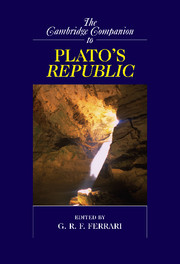Book contents
- Frontmatter
- 1 The Protreptic Rhetoric of the Republic
- 2 The Place of the Republic in Plato’s Political Thought
- 3 Rewriting the Poets in Plato’s Characters
- 4 Wise Guys and Smart Alecks in Republic 1 and 2
- 5 Justice and Virtue: The Republic’s Inquiry into Proper Difference
- 6 The Noble Lie
- 7 The Three-Part Soul
- 8 Eros in the Republic
- 9 The Utopian Character of Plato’s Ideal City
- 10 Philosophy, the Forms, and the Art of Ruling
- 11 Sun and Line: The Role of the Good
- 12 Beginning the “Longer Way”
- 13 The City-Soul Analogy
- 14 The Unhappy Tyrant and the Craft of Inner Rule
- 15 What Is Imitative Poetry and Why Is It Bad?
- 16 The Life-and-Death Journey of the Soul: Interpreting the Myth of Er
- Bibliography
- Index of Passages
- Index of Names and Subjects
- Series List
10 - Philosophy, the Forms, and the Art of Ruling
Published online by Cambridge University Press: 28 November 2007
- Frontmatter
- 1 The Protreptic Rhetoric of the Republic
- 2 The Place of the Republic in Plato’s Political Thought
- 3 Rewriting the Poets in Plato’s Characters
- 4 Wise Guys and Smart Alecks in Republic 1 and 2
- 5 Justice and Virtue: The Republic’s Inquiry into Proper Difference
- 6 The Noble Lie
- 7 The Three-Part Soul
- 8 Eros in the Republic
- 9 The Utopian Character of Plato’s Ideal City
- 10 Philosophy, the Forms, and the Art of Ruling
- 11 Sun and Line: The Role of the Good
- 12 Beginning the “Longer Way”
- 13 The City-Soul Analogy
- 14 The Unhappy Tyrant and the Craft of Inner Rule
- 15 What Is Imitative Poetry and Why Is It Bad?
- 16 The Life-and-Death Journey of the Soul: Interpreting the Myth of Er
- Bibliography
- Index of Passages
- Index of Names and Subjects
- Series List
Summary
WHY PHILOSOPHERS ARE EQUIPPED TO RULE
In his blueprint for an ideal society, the Socrates of Plato's Republic emphasizes three especially daring political proposals: first, inclusion of women in the guardian class, on fully equal terms with men; second, abolition of the family for this same elite class; and third, that philosophers should be kings. He speaks of these as three “waves” (5.457b-d, 472a, 473c-d), with the final proposal, that of philosopherkings, heralded as the third and biggest wave within the “triple wave” (trikumia, 5.472a).
Quite how destabilizing these proposals are meant to sound can be appreciated only when we realize that Socrates is referring here not just to stormy waves but to a veritable tsunami of change. Not only have tsunamis been a familiar feature of Mediterranean history in both ancient and modern times, but eyewitness accounts of tsunamis - including the massive one in the Indian Ocean on December 26, 2004 - again and again describe a sequence of three waves, an indication that it is this specific phenomenon that Plato is calling to mind. When Socrates speaks of a third and final wave as liable to “drown us in a deluge [katakluzein] of mockery and unbelievability” (5.473c), his reference is, if I am not mistaken, to a philosophical tsunami, a veritable cataclysm of incredulity that threatens to wash away his entire political agenda.
- Type
- Chapter
- Information
- The Cambridge Companion to Plato's Republic , pp. 256 - 283Publisher: Cambridge University PressPrint publication year: 2007
- 19
- Cited by

